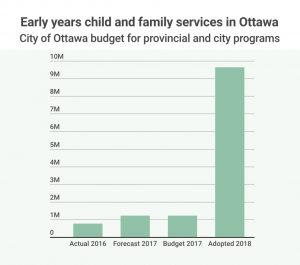The most vulnerable families and children in Ottawa feel left out of free government services. Meanwhile, the city’s plans to meet the needs of children under six and caregivers are still up in the air, even after a big budget boost.
City councillors voted in favour of a seven-fold budget increase for early years children and family services just weeks before the city began taking over previously provincially provided programs. But the municipal government could find themselves scrambling to fill a void, based on analysis of the 2018 city budget approved in December.
Helen Muleme is a registered practical nurse with two kids, a four-month-old and a four-year-old. So far, Muleme has been thrilled with weekly playgroups and workshops on feeding, car-seat safety, and lactation.
However, the mother of two fears for the future of early years services under the city’s control given her experience of the complicated child care registry and long wait times. “It makes me think that they won’t run the programs properly,” Muleme said. “It makes me nervous for moms who may not get as good of service.”

The City of Ottawa did not clarify exactly how the transfer will play out, but there are no plans for new centres. All city officials and experts in relevant committees and departments who were reached declined interviews. City spokespeople issued statements attributed to the manager of children’s services by email.
The province did not respond to questions by publication. But ministry cited some Ottawa parents who may rely on playgroups, pregnancy tips and parenting resources are being squeezed out due to the dismal reach of services.
Some caregivers who used child and family service centres raised accessibility troubles. Public input collected by the city last year indicated programs were held too far away and at inconvenient times. Respondents reported lack of playgroup availability and being turned away upon arrival due to capacity.
Ottawa is home to seven Ontario early years centres, plus satellite sites, who get municipal money in addition funds from the province.
The city injected $8.45-million more into the 2018 budget for early year centres before taking the reins from the province, according to a budget analysis. The municipal government agreed to bump up the budget for ministry-approved programs by 700 per cent from 2017 to 2018, which includes a one-time $9.6-million booster from the province.

The city began taking over responsibilities for early years child and family programs after the Ontario government announced in the fall to surrender service delivery. That brought an end to provincial funding which previously went directly to 13 not-for-profits who continue to run existing centres across Ottawa.
City spokespeople said that the province will continue to fund the city’s coffers. Jason Sabourin, manager of city-run children’s services, said the city will not need to foot any added costs. Future funding levels from the province are not expected to go down.
The difference is that now money will go through the municipality before it reaches the centres. Even with the city in control, all legislated programs must meet specific ministry-approved criteria in order to be dubbed under this new brand. All participating programs must operate at least five days a week, year-round.
The two governments are under a one-year deadline, which was extended to the end of 2019, to complete the transition.
“It makes me nervous for moms who may not get as good of service” – Helen Muleme, Ottawa parent
The city estimates that there are about 70,000 children under six living in Ottawa, based on the Canada census. Historically, many parents have not participated in child and family programs offered across the province. The province and city each recognize that services in Ottawa must adapt as community needs change and demands on families go up.
Moving forward with a provincial election underway this spring, parents and children hope the city snags steady funding and a solid plan to serve them.



